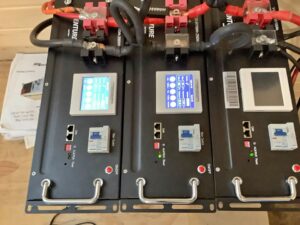Dreaming of breaking free from the traditional grid and embracing off-grid living in your mobile home? You’re not alone. With a surge in interest for sustainable and independent lifestyles, learning how to take your mobile home off the grid has become an appealing prospect. From reducing environmental impact to gaining self-sufficiency, this journey offers a newfound sense of freedom. In this guide, we’ll navigate through the essential steps and considerations to help you seamlessly transition your mobile home into an off-grid haven. Let’s embark on this transformative adventure towards sustainable living.

Benefits and Reasons for Mobile Off-the-Grid Transition
Reduced Reliance on Traditional Utilities
Transitioning your mobile home off the grid means freeing yourself from relying solely on traditional utilities such as electricity, water, and gas. By harnessing solar power or wind energy, you can generate your own electricity. This independence allows you to save money on utility bills and ensures that you have a continuous power supply even during outages. For example, installing solar panels on the roof of your mobile home enables you to capture sunlight and convert it into usable electricity.
Living off the grid also means sourcing water independently through methods like rainwater harvesting or digging a well. This reduces dependency on municipal water supplies while promoting sustainability by utilizing natural resources efficiently.
Lower Environmental Impact
One of the significant benefits of taking your mobile home off the grid is reducing its environmental impact. Generating energy from renewable sources like solar panels decreases reliance on fossil fuels, thereby lowering carbon emissions and contributing to a healthier environment. Using sustainable practices for waste management and conserving resources minimizes ecological harm.
By adopting eco-friendly techniques such as composting toilets or graywater systems, you can minimize water usage and reduce pollution levels in surrounding ecosystems.
Increased Self-Sufficiency and Independence
Embracing an off-grid lifestyle fosters self-sufficiency by encouraging individuals to rely on their skills and available resources rather than external amenities. It promotes a sense of independence by empowering people to meet their needs without depending heavily on outside infrastructure or services.
Moreover, being self-sufficient provides a sense of security during emergencies or unforeseen circumstances when access to conventional utilities may be disrupted.

Looking for an amazing book to help you live off grid in your mobile home. Here we share with you all the projects that make a small paradise in minute detail so that you can start implementing them on your land or in your house and profit for the rest of your life.
We’ll also cover subjects in depth such as water, food preservation, off grid power, medicinal garden, you name it. We want to put in your hands helpful how-to illustrations … easy to follow, step-by-step advice … brilliant tips and ingenious time-savers. From all the projects you’ll find in The Self-Sufficient Backyard I’m pretty sure you’ll find some that are suitable for your property. CLICK HERE TO ORDER NOW

Insulating Your Mobile Home for Energy Efficiency
Importance of Insulation
Proper insulation is crucial when taking your mobile home off the grid. It helps regulate the internal temperature, keeping it cool in summer and warm in winter. Without adequate insulation, you may struggle to maintain a comfortable living environment regardless of external weather conditions.
Insulation not only prevents heat loss during colder months but also stops excessive heat from entering during warmer seasons. This means you’ll rely less on heating and cooling systems, leading to reduced energy consumption and lower utility bills. By insulating your mobile home effectively, you can create a more sustainable living space while minimizing your environmental impact.
Types of Insulation Materials
When insulating your mobile home, consider using materials such as fiberglass, foam board, or reflective foil insulation. These options are lightweight and well-suited for mobile homes due to their flexibility and ease of installation. Fiberglass is commonly used for walls and ceilings, while foam board is ideal for underfloor insulation.
Reflective foil insulation can be installed in attics or underneath roofs to minimize radiant heat transfer into the living areas. Each material offers its own benefits in terms of cost-effectiveness, durability, and thermal performance.
Powering Your Mobile Home with Solar Energy
Advantages of Solar Energy for Off-Grid Living
Harnessing solar energy for your mobile home offers numerous benefits. Firstly, it’s a clean and renewable energy source that reduces reliance on traditional power grids. This means lower utility bills and increased self-sufficiency. solar power is environmentally friendly, reducing carbon emissions and contributing to a greener planet. Moreover, solar panels require minimal maintenance, making them a hassle-free option for off-grid living.
Furthermore, solar energy systems can provide reliable electricity in remote locations where connecting to the grid might be challenging or costly. This makes them ideal for mobile homeowners seeking independence from traditional utilities while enjoying the flexibility of moving their homes to different locations.
Installation Options for Solar Panels on a Mobile Home
When considering installing solar panels on your mobile home, there are various options available. You can opt for roof-mounted panels or ground-mounted installations based on your specific requirements and available space. For instance, if you own a travel trailer or RV (recreational vehicle), portable solar panel kits offer flexibility as they can be adjusted to capture peak sunlight throughout the day.
Passive solar design elements such as large windows and skylights can maximize natural light within your mobile home during winter months when sunlight is limited. These features help reduce the need for artificial lighting while enhancing overall energy efficiency.
Storage Solutions for Solar-Generated Electricity
Storing excess electricity generated by your solar system is crucial for off-grid living. Utilizing deep cycle batteries enables you to store surplus power generated during peak sunlight hours and access it when needed—especially during periods of low sunlight or at night. Furthermore, integrating an efficient electrical system with inverters allows you to convert stored DC (direct current) electricity into AC (alternating current) power ready for use in your mobile home appliances.
Read more on our article: Solar Panels for Mobile Homes

Water-Wise Solutions and Sustainable Sewage Management
Implementing Water-Saving Fixtures
Implementing water-saving fixtures is crucial. By using low-flow faucets, showerheads, and toilets, you can significantly reduce water consumption. These fixtures help conserve drinking water while ensuring efficient usage for daily needs. Installing a rainwater harvesting system allows you to collect and store rainwater for various non-potable uses such as irrigation and cleaning.
Utilizing greywater recycling methods further enhances your sustainable living approach. Greywater from sinks, showers, and washing machines can be treated and reused for purposes like landscape irrigation or flushing toilets. This smart way of repurposing water not only reduces reliance on freshwater sources but also promotes a more eco-friendly lifestyle.
Sustainable Sewage Treatment Options
For long-term sewage management in off-grid living, composting toilets offer an environmentally friendly solution. These systems use little to no water and transform human waste into compost that can be safely returned to the land as a nutrient-rich fertilizer. Moreover, constructing a well-designed septic system tailored for mobile homes ensures effective waste disposal without harming the environment.

Eco-Friendly Appliances and Energy Conservation
Energy-Efficient Appliances
Choosing energy-efficient appliances is crucial. Look for appliances with the ENERGY STAR label, such as refrigerators, washing machines, and air conditioners. These appliances are designed to consume less electricity while maintaining high performance. For instance, an ENERGY STAR refrigerator uses about 15% less energy than non-certified models.
In addition to this, consider investing in LED lighting for your mobile home. LED bulbs use significantly less energy than traditional incandescent bulbs and last much longer. By replacing all your lights with LEDs, you can substantially reduce electricity consumption needs without compromising on brightness or quality of light.
Tips for Reducing Energy Consumption
Reducing energy consumption in daily activities is essential when living off the grid. Simple habits like turning off lights when not in use and unplugging electronics can make a significant difference over time. Furthermore, using natural light during the day instead of artificial lighting reduces reliance on electricity.
Moreover, proper insulation and sealing cracks in windows and doors help maintain a comfortable temperature inside your mobile home without excessive use of heating or cooling systems. This not only lowers electricity bills but also contributes to environmental benefits by reducing overall energy use.

Heating and Cooling Solutions for Off-the-Grid Homes
Off-Grid Heating Systems
You have various options for heating, including wood stoves and propane heaters. Wood stoves are a popular choice due to their reliability and ability to provide warmth without relying on electricity. They can also be used for cooking, making them a versatile off-grid solution. On the other hand, propane heaters offer convenience and consistent heat output, making them suitable for tiny homes or mobile dwellings.
Thermal mass is an essential consideration when selecting heating solutions for off-grid homes. Thermal mass materials like brick or stone absorb heat during the day and release it slowly at night, helping to maintain a comfortable temperature inside your home without constant reliance on active heating systems.
Natural Cooling Strategies
In off-the-grid living, implementing natural cooling strategies is crucial to maintaining comfortable indoor temperatures without traditional air conditioning units. Utilizing shade from trees or installing reflective roofing can help minimize heat gain in your home during hot weather. Cross ventilation by strategically placing windows can encourage airflow throughout the living space, promoting natural cooling without consuming additional energy resources.
Moreover, considering passive cooling methods such as earth berming or utilizing cool underground air can contribute significantly to reducing the need for mechanical cooling systems in off-grid homes.
Importance of Proper Ventilation
Proper ventilation plays a vital role in ensuring indoor air quality and regulating moisture levels within off-grid homes. Installing efficient venting systems helps remove stale air while allowing fresh air circulation throughout the living space. This not only contributes to a healthier indoor environment but also prevents issues related to excess moisture buildup that could lead to mold growth.
Furthermore, incorporating energy-efficient ceiling fans powered by renewable energy sources like solar panels can enhance airflow within your off-the-grid dwelling while minimizing reliance on grid-connected power supplies.
Innovations in Water Generation for Off-the-Grid Living
Innovative Methods
Innovative methods for generating water off the grid are crucial for sustainable living. Rainwater harvesting systems, such as collecting rain from the roof and storing it in tanks, provide a renewable source of water. Using solar-powered pumps to extract groundwater is an efficient way to access clean water without relying on traditional utilities.
Another innovative method involves atmospheric water generators that extract moisture from the air, providing a consistent supply of drinking water. These compact devices utilize condensation technology to produce pure drinking water, making them ideal for living vehicles or remote off-grid homes.
Desalination Options
Desalination offers a viable solution for achieving water independence when living off the grid. By removing salt and other impurities from seawater or brackish water sources, desalination plants can provide freshwater for consumption and agricultural needs. While this process traditionally requires significant energy input, advancements in renewable energy technologies have made desalination more feasible for off-grid applications.
Furthermore, portable desalination devices equipped with reverse osmosis technology offer a convenient option for individuals seeking self-sufficiency in areas with limited freshwater resources.
Importance of Water Storage
The importance of water storage solutions cannot be overstated in off-grid living scenarios. Reliable storage facilities such as tanks or cisterns enable residents to store harvested rainwater or treated groundwater effectively. Adequate storage capacity ensures a continuous supply during dry spells or inclement weather conditions.
Moreover, integrating efficient filtration systems into the storage infrastructure helps maintain water quality over time by preventing contamination and sediment buildup.
Summary
Congratulations on making it through the essential steps to take your mobile home off the grid! By insulating your home, harnessing solar energy, managing water efficiently, using eco-friendly appliances, and implementing innovative solutions, you’re well on your way to a sustainable and self-sufficient lifestyle. Embracing these changes not only reduces your environmental impact but also offers long-term cost savings. Now, it’s time to take action. Start by assessing which of these steps you can implement and create a plan to gradually transition your mobile home off the grid. Remember, every small change contributes to a significant difference in the bigger picture. You’ve got this!
Now go out there and make those eco-friendly upgrades to your mobile home! Your efforts will not only benefit the environment but also enhance your quality of life. Happy off-the-grid living!
Frequently Asked Questions
How can I benefit from transitioning my mobile home off the grid?
Transitioning your mobile home off the grid offers independence from traditional utilities, cost savings, and reduced environmental impact. You’ll enjoy self-sufficiency and a more sustainable lifestyle.
What are some eco-friendly appliances suitable for off-the-grid living?
Energy-efficient refrigerators, low-consumption LED lighting, and propane-powered stoves are ideal for minimizing energy usage in an off-the-grid mobile home. Look for appliances with high Energy Star ratings.
Is solar energy a practical option for powering a mobile home off the grid?
Absolutely! Solar panels provide clean and renewable energy to power your off-the-grid mobile home. With advancements in solar technology, it’s now more efficient and affordable than ever to go solar.
How can I ensure water sustainability when living off the grid in a mobile home?
Implementing water-wise solutions such as rainwater harvesting, greywater recycling systems, and efficient fixtures will help you sustainably manage water resources while living off the grid.
What are some effective ways to insulate my mobile home for improved energy efficiency?
Utilize insulation materials specifically designed for mobile homes to reduce heat loss or gain. Consider adding skirting around the base of your home to prevent cold air infiltration during winter months.
You might be interested in these articles as well:

